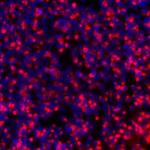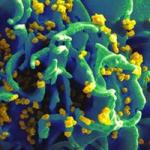
Avindra Nath, M.D.
Senior Investigator
Section of Infections of The Nervous System, Division of Neuroimmunology & Neurovirology
NINDS
Clinical Director
NINDS
Research Topics
The overarching goal of our laboratory is to understand how the human brain adapts to invasion by viruses and if failure of this adaptation leads to neurological diseases. When the brain encounters a new pathogen, an acute encephalitis occurs, which is accompanied by a massive inflammatory response. Over time either the pathogen is eliminated, or it adapts to the environment in the brain and can survive in the brain for extended periods of time or for the lifespan of the individual. Retroviruses are particularly adept at such processes, but some RNA viruses can acquire novel mutations to aid their spread and persistence in the brain. Studies from our lab and those of others on SARS-CoV-2 suggest that antigenic persistence may contribute to the long-term complications in these patients.
These diseases provide an opportunity to study these complex viral-host relationships. Indeed, the human genome has been invaded by retroviruses over millions of years. These proviruses and retroviral elements have established a process of equilibrium and a symbiotic relationship with the human genome and play important roles in embryogenesis and brain development. A breakdown in this relationship may lead to a disease state. The most recent retrovirus to infect humans is the human immunodeficiency virus (HIV). Soon after infection, the virus establishes a reservoir in the brain where it may reside indefinitely. It also undergoes multiple mutations resulting in defective viral sequences, a phenomenon that is similar to the endogenized retroviruses (HERVs). However, these sequences may have intact open reading frames that code for specific viral proteins and have the potential for affecting cellular function. Our laboratory is interested in studying these phenomena in the context of HIV and HERV-K subtype HML-2; both of which have been associated with neurodegenerative diseases. We are also interested in determining if other RNA viruses act in a similar manner. Here the focus is on SARS-CoV-2.
- Neuropathogenesis of HIV infection: HIV reservoirs get established in the brain early during infection and current antiretroviral therapy does not impact the size of the reservoir. The brain also accumulates defective viral sequences, the role of which is poorly understood but is reminiscent of the endogenous retroviruses in the human genome. Our laboratory is focused on characterizing the virus in the brain and studying the mechanisms by which the virus persists for extended periods of time. We have shown that viral transcripts and viral proteins produced in the brain despite adequate antiretroviral therapy, hence we are developing means to block its effects. We have established a well characterized cohort of HIV-infected individuals to determine the various forms of neurological manifestations and underlying disease pathophysiology in the context of viral persistence.
- Role of endogenous retroviruses in neurological diseases: Retroviral sequences remain dormant in the human genome and occupy nearly 8% of the genomic sequence. We have shown that one of these viruses termed HERV-K (HML-2) is activated in patients with amyotrophic lateral sclerosis (ALS), and transgenic animals that express the envelope protein of HERV-K develop ALS like symptoms. Hence, we are now using a wide variety of in vitro, and in vivo studies to determine the physiological role of HERV-K in early stages of development and the mechanisms by which its expression is regulated and causes neurotoxicity to motor neurons. We are also developing new antiviral compounds and molecular techniques for blocking HERV-K.
- Undiagnosed Neuroimmune and neuroinfectious diseases: Undiagnosed neuroinflammatory diseases carry a huge burden with devastating consequences. In collaboration with other researchers in NINDS and other institutes, we are investigating these patients and developing new diagnostic methods and modes of treatment for these diseases. An example of which is our observation that patients with Nodding syndrome have autoantibodies to a newly discovered protein in the brain, liemodin-1, caused by a molecular mimicry with a protein in a parasite, onchocerca. We have also discovered that under certain circumstances, RNA viruses such as Dengue, Yellow Fever and likely West Nile virus can persist in the brain and present as a neurodegenerative disease.
Biography
Dr. Nath received his MD degree from Christian Medical College in India in 1981 and completed a residency in Neurology from University of Texas Health Science Center in Houston, followed by a fellowship in Multiple Sclerosis and Neurovirology at the same institution and then a fellowship in Neuro-AIDS at NINDS. He held faculty positions at the University of Manitoba (1990-97) and the University of Kentucky (1997-02). In 2002, he joined Johns Hopkins University as Professor of Neurology and Director of the Division of Neuroimmunology and Neurological Infections. He joined NIH in 2011 as the Clinical Director of NINDS, the Director of the Translational Neuroscience Center and Chief of the Section of Infections of the Nervous System. His research focuses on understanding the pathophysiology of retroviral infections of the nervous system and the development of new diagnostic and therapeutic approaches for these diseases.
Selected Publications
- Wang T, Medynets M, Johnson KR, Doucet-O'Hare TT, DiSanza B, Li W, Xu Y, Bagnell A, Tyagi R, Sampson K, Malik N, Steiner J, Hadegan A, Kowalak J, O'Malley J, Maric D, Nath A. Regulation of stem cell function and neuronal differentiation by HERV-K via mTOR pathway. Proc Natl Acad Sci U S A. 2020;117(30):17842-17853.
- Li W, Lee MH, Henderson L, Tyagi R, Bachani M, Steiner J, Campanac E, Hoffman DA, von Geldern G, Johnson K, Maric D, Morris HD, Lentz M, Pak K, Mammen A, Ostrow L, Rothstein J, Nath A. Human endogenous retrovirus-K contributes to motor neuron disease. Sci Transl Med. 2015;7(307):307ra153.
- Li GH, Maric D, Major EO, Nath A. Productive HIV infection in astrocytes can be established via a non-classical mechanism. AIDS. 2020.
- Henderson LJ, Johnson TP, Smith BR, Reoma LB, Santamaria UA, Bachani M, Demarino C, Barclay RA, Snow J, Sacktor N, Mcarthur J, Letendre S, Steiner J, Kashanchi F, Nath A. Presence of Tat and transactivation response element in spinal fluid despite antiretroviral therapy. AIDS. 2019;33 Suppl 2:S145-S157.
- Cortese I, Muranski P, Enose-Akahata Y, Ha SK, Smith B, Monaco M, Ryschkewitsch C, Major EO, Ohayon J, Schindler MK, Beck E, Reoma LB, Jacobson S, Reich DS, Nath A. Pembrolizumab Treatment for Progressive Multifocal Leukoencephalopathy. N Engl J Med. 2019;380(17):1597-1605.
Related Scientific Focus Areas




Microbiology and Infectious Diseases
View additional Principal Investigators in Microbiology and Infectious Diseases

This page was last updated on Wednesday, May 28, 2025